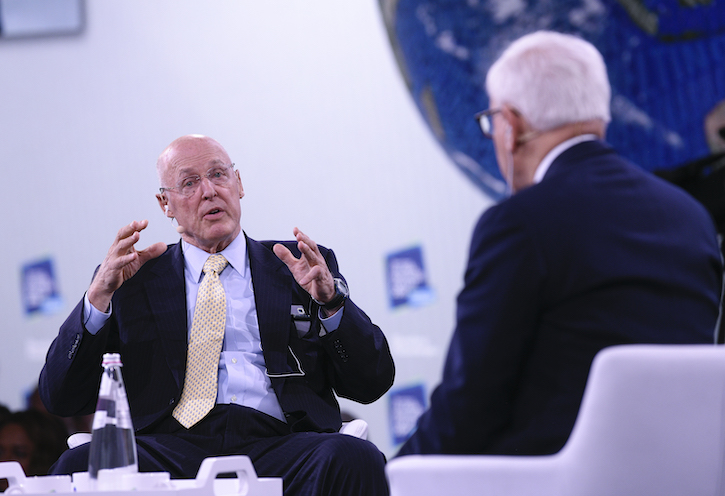“Climate change is the most formidable, catastrophic, absolute certain risk to our economic security and social stability,” said Hank Paulson, Chairman of the Paulson Institute, at the 2019 Bloomberg Global Business Forum in New York City.
Speaking in conversation with China’s Special Representative for Climate Change Affairs Xie Zhenhua and moderated by The Carlyle Group Co-Founder David Rubenstein, Paulson commended the “amazing” progress that China has made in addressing its dirty air, water, and soil. However, it is vital that China not let up on its efforts to reduce emissions, which are currently twice as much as those of the United States and Europe combined. Given this scale, China is the most important player in the global campaign to reduce emissions.
“China’s leadership on climate change is absolutely essential,” said Paulson, “if China doesn’t succeed, we have very little chance of mitigating these long-term risks.”
Investing in the environment can also be a profitable endeavor. Paulson cited one report which found that opportunities in environmental goods and services could be worth up to $1 trillion in China alone. In addition, China has taken steps to create vehicles to attract private capital, becoming the second-largest issuer of green bonds, which help finance the transition to a cleaner economy. One of the hurdles in the growth of green bonds, however, is that there is no universal definition of “green.” Unlike in the United States and Europe, for example, a clean coal plant is still considered a green investment in China. China is reconsidering this designation, which will bring it more on par with the commonly accepted criteria of green investments.
Furthermore, Paulson advocates free trade for products and services that can help mitigate climate change, “When I was Treasury Secretary, I pushed very hard to eliminate the tariffs on environmental goods and services.”
“In weak economies, often what you see is the environment gets shortchanged.” —Henry M. Paulson, Jr.
China has been on a positive path in reducing its carbon emissions, but there are concerns that its vigilance might be slipping as the economy weakens. Emissions have been rising in the last two quarters, a reverse of the previous trend. “In weak economies, often what you see is the environment gets shortchanged,” said Paulson. Yet if China is to stay on track for meeting its climate change goals, it cannot afford to let up on its stance of reducing emissions.
Just as China’s actions are important at home, it is critical as a global player. China’s Belt and Road Initiative (BRI) reaches across 126 countries, and Chinese President Xi Jinping has said that the BRI should have a green focus. With China providing much of the financing for infrastructure development along the Belt and Road, including for coal-fired power plants, Paulson encouraged China to set the strictest environmental standards possible. The Paulson Institute is supporting a green BRI through promoting green lending principles for development along the BRI. “Having really strong standards can make a very big difference,” according to Paulson. If the infrastructure development along the BRI is not handled in a sustainable manner, the emissions from the 126 countries could be larger than those of China.
The Bloomberg Global Business Forum is an annual event that convenes the most important global leaders from the public and private sectors to address these threats from global warming to economic prosperity and examine the opportunities for solutions.
Full Video



